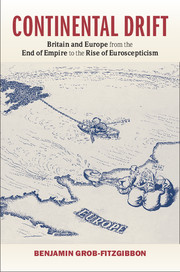Book contents
- Frontmatter
- Dedication
- Contents
- Acknowledgements
- List of abbreviations
- Introduction
- Part 1 Imperial Europeans
- 1 A world undone
- 2 Mr Churchill's Europe
- 3 Mr Bevin's response
- 4 The German problem
- 5 A disunited Europe?
- 6 The continental surprise and the fall of the Labour government
- 7 The realities of government
- 8 Perfidious Gaul
- 9 The decline and fall of the imperial Europeans
- Part 2 Post-imperial Eurosceptics
- Conclusion: Post-imperial Britain and the rise of Euroscepticism
- Notes
- Bibliography
- Index
5 - A disunited Europe?
from Part 1 - Imperial Europeans
Published online by Cambridge University Press: 05 May 2016
- Frontmatter
- Dedication
- Contents
- Acknowledgements
- List of abbreviations
- Introduction
- Part 1 Imperial Europeans
- 1 A world undone
- 2 Mr Churchill's Europe
- 3 Mr Bevin's response
- 4 The German problem
- 5 A disunited Europe?
- 6 The continental surprise and the fall of the Labour government
- 7 The realities of government
- 8 Perfidious Gaul
- 9 The decline and fall of the imperial Europeans
- Part 2 Post-imperial Eurosceptics
- Conclusion: Post-imperial Britain and the rise of Euroscepticism
- Notes
- Bibliography
- Index
Summary
Winston Churchill was not immune to the effects of the Berlin crisis on his calls for European unity. Yet nor did he think it in any way undermined the underlying principles he had championed since the end of the war; after all, he had been one of the first to warn of the Soviet threat and the first to suggest that Germany needed to feel the welcoming embrace of the West sooner rather than later. In late July 1948, shortly after the crisis in Berlin began, he dispatched Anthony Eden to West Germany to report first-hand on the situation there. In almost all respects, Eden found it ‘far better than it was a year ago’. The Germans had now ‘passed out of the stage of apathy which characterised the first two years of the post-war period’, and the British and American authorities were ‘enjoying considerably more friendly support than they had hitherto’. In Berlin, there was even a ‘wave of enthusiasm for the Western Allies’, which Eden found quite remarkable given that not three years had passed since they were at war. Nevertheless, he was disturbed by the ‘fundamental lack of understanding among almost all classes and ages of the meaning of the word “democracy”’, and he found that although the Germans had ‘largely discarded Nazism as such, … nothing has taken its place’. The time was ripe for the British to fill the void with their own ideologies.
Churchill's position was strengthened by a public opinion poll published in the Daily Express on 8 September 1948, which suggested that the ‘Government are not carrying their own people with them in their policy’ of only gradual moves towards European Union. Starting with the premise that the French cabinet had now publicly voiced its support for a European Assembly and a Western Union that would ‘embrace Great Britain, France, the Netherlands, Belgium and Luxembourg’, the poll found that 65 per cent of the British public favoured an ‘economic union … with common Customs’ (with just 13 per cent opposed), 68 per cent supported a ‘military union’ where all countries would ‘give and receive armed assistance to any member of the Western Union if attacked’ (with 16 per cent opposed) and 58 per cent wanted a ‘political union providing for a European Supreme Court with power to impose sanctions’ (with, again, 16 per cent opposed).
- Type
- Chapter
- Information
- Continental DriftBritain and Europe from the End of Empire to the Rise of Euroscepticism, pp. 99 - 122Publisher: Cambridge University PressPrint publication year: 2016



